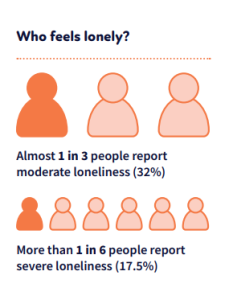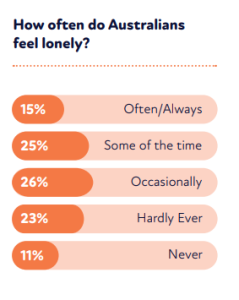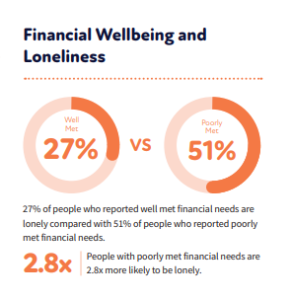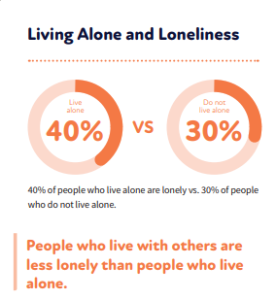Alone Together: A Deep Dive into Australia’s Loneliness Crisis
- Community
-
Mar 10
- Share post

The Bunch Up has partnered with Friends for Good to shed light on the Australian loneliness crisis and how it can be combated.
Around 32% of the Australian population is moderately lonely while more than 17% is severely lonely. While we generally associate loneliness with a certain kind of people like the elderly, this might not be entirely true.
According to the latest State of Nation Report by Ending Loneliness Together, around 22% of young adults suffer from loneliness. The report also states that both men and women suffer from loneliness almost equally. Another startling finding of the report is that while 40% of people living alone are lonely, 30% of those living with others are also lonely. These statistics suggest that being lonely doesn’t necessarily mean being alone. People living with others can also feel lonely.
So, what exactly is loneliness?
What is Loneliness?
Researchers define loneliness as “a distressing feeling that accompanies the perception that one’s social needs are not being met by the quantity or especially the quality of one’s social relationships.”
In simple terms, loneliness is the feeling you get when your actual level of social connections doesn’t match the desired level. For instance, if you don’t have as many friends as you would like to have, you are likely to feel lonely. Conversely, if you have a decent amount of friends and family around and yet you don’t feel connected to them, you can still be lonely. So, the feeling of loneliness can come from both inadequate quantity and quality of social connections.
It’s also important to understand that social isolation and loneliness, although interconnected, aren’t the same thing. Social isolation is the situation where you are isolated from people while loneliness is the perception of not having the adequate level of social connection. Many people can be lonely, despite not being socially isolated.
Who Feels Lonely?
Loneliness can affect anyone from any age, gender, or social group. A comprehensive study conducted in 2023 by Ending Loneliness Together, an organisation dedicated to raising awareness about chronic loneliness, revealed some interesting facts:
- 15% Australians are often or always lonely.
- Young adults and middle-aged people feel lonelier than the other age groups.
- 37% of carers feel lonely.
- 35% of the rural population and 30% of the metropolitan population are lonely.
- Men and women are equally lonely.
- Australians living alone and Australians living with others both experience loneliness.
- People living in poor financial conditions are twice as likely to be lonely than others.
Consequences of Loneliness
Almost all of us have felt lonely at one moment or another. So, why is it such a big deal? Feeling lonely once in a while is normal, however, the constant and severe feeling of loneliness can lead to many physical and mental health issues.
Several studies have been conducted to understand the impact of loneliness on one’s physical and mental well-being and the results are telling. A 2015 meta-analytical review found that social isolation and loneliness can lead to an increased risk of early mortality. Another meta-analysis of 32 longitudinal studies published in 2022 concluded that adults who experience loneliness are 2x more likely to develop depression over time.
A 2014 study published in the Journal of Clinical and Diagnostic Research suggests that loneliness can lead to various psychiatric and physical disorders like depression, personality disorders, Alzheimer’s disease, diabetes, autoimmune disorders, cardiovascular diseases, obesity, and so on. These findings are reinforced by a 2020 study that associates loneliness and social isolation in older adults with conditions like cardiovascular disease, dementia, cognitive decline, and worsening anxiety and depressive symptoms. The study also likens the health impact of loneliness to that of cigarette smoking, alcohol consumption, physical inactivity, and obesity.
The State of Nation Report by Ending Loneliness Together also shows a strong association between loneliness, and, depression and social anxiety.

What Causes Loneliness?
If we want to successfully combat loneliness, we must understand its underlying causes. While social isolation and lack of meaningful connections are the obvious contributing factors to loneliness, there are some less obvious culprits as well.
As more and more people are moving away from home and living alone, the incidents of loneliness are rising. Similarly, the rampant use of social media has also affected the quality of our social relations, ultimately causing loneliness in many young adults. The stigma associated with talking about loneliness or mental health and the reluctance to seek support further exacerbates the situation.
How to Combat Loneliness?
Although loneliness has become a public health issue, it is not something that can’t be remedied. Through concerted efforts at individual, community, and societal levels, we can fight the loneliness epidemic and foster a culture of connection and belonging.
The most important measure would be to raise awareness and remove the stigma around loneliness. As Laura Rouhan, the co-founder of Friends for Good rightly put, “Given the negative mental and physical health impacts of loneliness, raising awareness and addressing this stigma should be a priority area for funding from all levels of government and should be given attention in the same way as mental health awareness.”
It is important to let people know that they are not alone in this battle and it is not something to be ashamed of. People need to be made aware of what loneliness is by dispelling all the prevalent misconceptions.
Steps like promoting intergenerational connections, community engagement, and destigmatizing mental health can help reduce loneliness among the general population. We, at both individual and community levels, should encourage meaningful interactions. Platforms like The Bunch Up are designed to do exactly that.
The CEO of The Bunch Up, Chai Bade is committed to helping Australians fight loneliness with meaningful interactions. He said, “In a world increasingly connected by technology, we often find ourselves facing a profoundly human disconnect: loneliness. Studies reveal a startling truth – loneliness is as detrimental to our health as smoking 15 cigarettes a day. It weakens our immune system, intensifies anxiety, and deepens depression. We crave connection, yet the very tools that promise it can leave us feeling isolated.
Here at The Bunch Up, we believe the antidote to loneliness isn’t found in screens, but in shared experiences, often in smaller, more intimate settings. We bridge the gap between longing and belonging, fostering real-life connections based on shared interests. It’s time to rewrite the narrative of loneliness, one meaningful interaction at a time.”
Final Thoughts
The World Health Organisation recognises loneliness and social isolation as a public health priority at the global level. With loneliness being linked to an increased risk of mortality, we need to prioritise empathy, compassion, and human connection, so that we can build resilient communities where no one feels alone.
If you are experiencing loneliness, Friends for Good’s FriendLine is available seven days a week (10 am to 8 pm) with volunteers ready for a friendly chat. The number is 1800 4 CHATS (1800 424 287).
Browse Activities in your Area
- {{ listingType.name }}
- prev
- next









